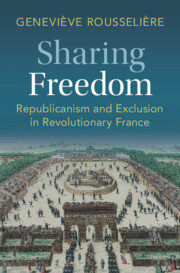Book contents
- Sharing Freedom
- Sharing Freedom
- Copyright page
- Contents
- Acknowledgments
- Note on Editions, Translations, and Abbreviations
- Introduction
- 1 Plural Beginnings
- 2 Rousseau’s Proposal
- 3 Revolutionary Republicanisms
- 4 The Paradox of Republican Emancipation
- 5 The Paradox of National Universalism
- Conclusion
- Bibliography
- Index
2 - Rousseau’s Proposal
Published online by Cambridge University Press: 28 March 2024
- Sharing Freedom
- Sharing Freedom
- Copyright page
- Contents
- Acknowledgments
- Note on Editions, Translations, and Abbreviations
- Introduction
- 1 Plural Beginnings
- 2 Rousseau’s Proposal
- 3 Revolutionary Republicanisms
- 4 The Paradox of Republican Emancipation
- 5 The Paradox of National Universalism
- Conclusion
- Bibliography
- Index
Summary
Chapter 2 presents the conceptual transformation of republicanism that Rousseau operated while responding to Montesquieu’s challenges. In his writings, republicanism moved from an elitist theory based on virtuous self-sacrifice to an inclusive theory based on popular sovereignty and the rational interest of citizens. Rousseau developed a theory of republican citizenship as a shared intention toward creating and maintaining a community of free and equal beings—an inclusive theory of sharing freedom. Yet Rousseau’s theory has important shortcomings that plagued French republicanism after him. On the one hand, it presented a rational project of sharing equal freedom among all, but on the other, it emphasized particularism and nationalism as conditions of its realization.
- Type
- Chapter
- Information
- Sharing FreedomRepublicanism and Exclusion in Revolutionary France, pp. 75 - 103Publisher: Cambridge University PressPrint publication year: 2024

